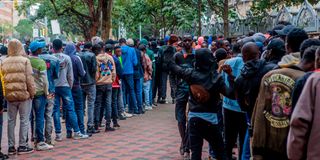‘Sh2.5bn was pumped into the economy by Worldcoin irregularly’

Kenyans queue at the KICC in Nairobi on August 1 2023, to register for the Worldcoin Cryptocurrency.
It has emerged that at least Sh2.5 billion was irregularly injected into the economy through M-Pesa payments to Kenyans who signed up for cryptocurrency project Worldcoin before its activities in the country were hurriedly suspended by the government.
The National Computer Cybercrime Coordination Committee (NC4) has revealed that, by the time Worldcoin operations were suspended in Kenya, over 350,000 people had enlisted by having their irises scanned.
The registration was done in exchange for a “World ID” and free cryptocurrency. An ad hoc committee of the National Assembly that is investigating Worldcoin activities in the country was told by Director of Criminal Investigations (DCI) Mohammed Amin on Monday that each of the 350,000 Kenyans was paid in cryptocurrency, translating to about Sh7,000.
Although the session with the DCI was held behind closed doors, Maara MP Kareke Mbiuki, the vice chair of the committee, told Nation Mr Amin confirmed to them that the payment was in cryptocurrency, which was then converted to hard cash via M-Pesa.
The committee that is chaired by Narok West lawmaker Gabriel Tongoyo heard that the transaction violated the Proceeds of Crime and Anti-Money Laundering Act and could as well border on terrorism financing because it was not declared as required by the Central Bank of Kenya (CBK) rules.
The committee has until September 28 to submit its report to the House for debate. Mr Amin’s revelations saw the committee demand that the management of Safaricom, which owns Mpesa, be summoned to explain why they were unable to flag the “illicit” transactions.
CBK Governor Kamau Thugge on Tuesday told the MPs that “we do not have solid information about cryptocurrency trading in Kenya.”
“We do not recognise cryptocurrency trading in the country because we have not given them the license to operate. There has been no survey done to establish the extent of crypto asset usage in the country. So, how were we going to monitor what we have not licensed?” said Dr Thugge.
This was in response to queries about why he failed to detect the payment. Dr Thugge told the committee that it was difficult to flag the Sh2.5 billion transaction given the large volumes of M-Pesa transactions.
He said that in a year, M-Pesa averages about Sh35 trillion in transactions. Although he had promised to take up the matter with Safaricom, he told the committee to go ahead and summon the firm to explain why it did not flag the irregular transaction. Fed up with “unsatisfactory” responses, the committee accused Dr Thugge of feigning ignorance of the realities of cryptocurrency trading in the country.
“We are struggling to understand you. You are saying that there are insufficient laws to regulate the cryptocurrency trade yet there is already trading. So, as the industry regulator, what are you doing about it?” Mr Mbiuki asked.
“We have a task force in place that has until the end of this month to come up with a report that will guide the development of a regulatory framework,” the CBK boss replied.





